Ever wondered if the resilient larch is a hardwood? Let’s dive in and uncover the facts!
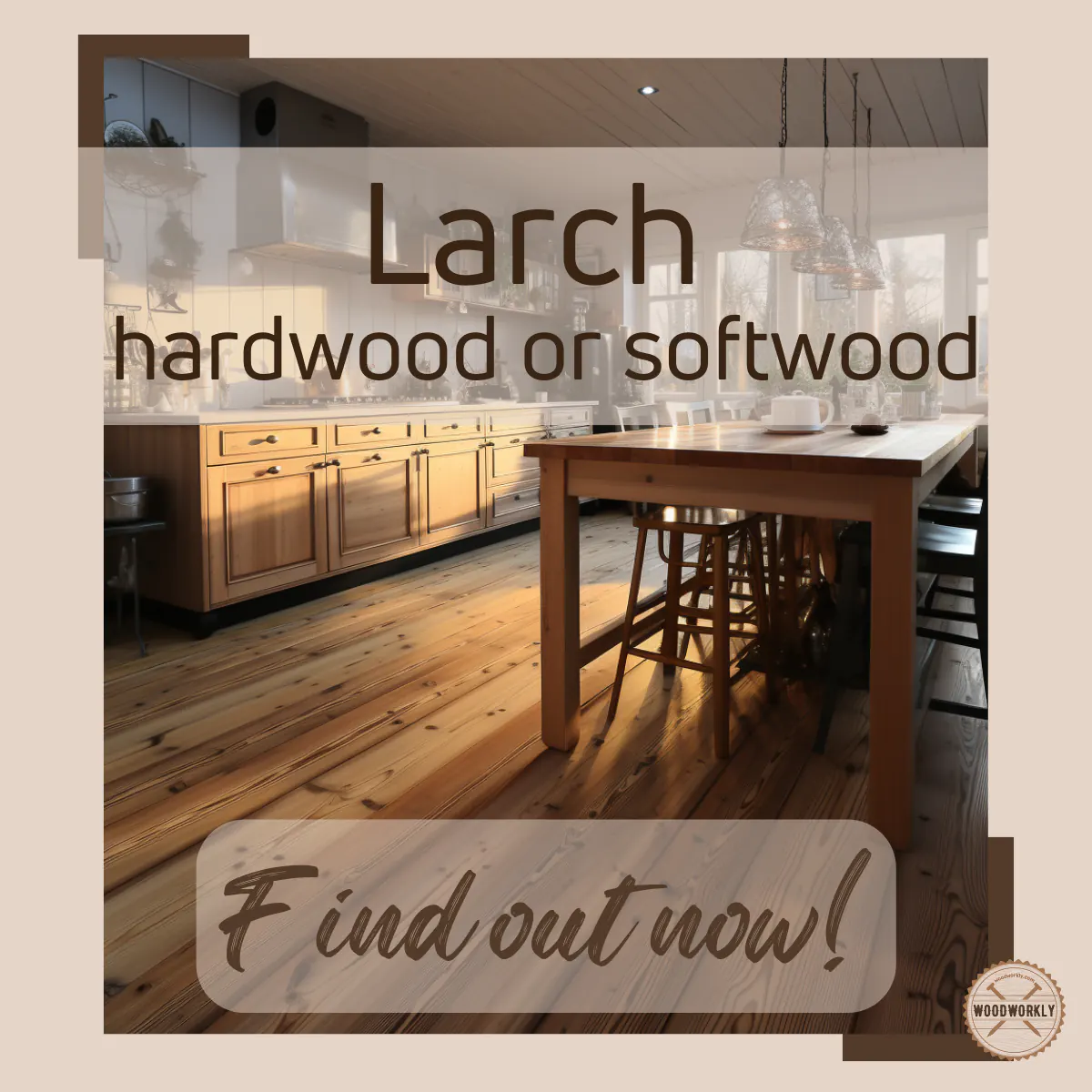
Larch is a popular wood type in making boats, sheds, fencing, flooring, and homes.
It usually grows in cold climates and is famous among woodworkers due to its cool features.
When I was first working with larch wood for making some heavy-duty furniture items, I was curious about its hardness because it was tougher than I expected.

So, I did some research and found lots of things about the hardness of larch wood thanks to the timber experts in my area.
So, let’s find out, Is larch a hardwood
No, Larch is not a hardwood. Larch is a softwood with tough, waterproof, and excellent durable qualities than many softwoods. Larch wood has a hardness rating of 830 lbf (3,690 N) which is harder than most softwoods. It come from deciduous conifer trees like other softwoods.
But that’s a quick snapshot and there’s a lot more to know about the hardness of larch just than that!
In this article, I’ll explore whether is larch a hardwood, how hard larch wood is, the characteristic qualities of larch wood compared to other woods and the strength of larch wood, and more.
Furthermore, I’ll answer some frequently asked questions as well.
Let’s jump in!

First of all, let’s take a quick look at what is larch wood.
What is Larch Wood?
Larch has a long and storied history, being native to regions like Bavaria, the Carpathians, and the Swiss Alps.
This remarkable tree species has been captivating humans since the seventeenth century when it began to spread across Europe.
Nowadays, it stands tall and proud in the massive Barorial forests spanning Finland and Russia.
Imagine walking through these grand forests, the tallest Larch trees reaching up to 45 meters, standing as silent guardians of the ancient lands.
This hardy tree species has adapted to thrive in the coldest winters, often found flourishing in mountainous regions.
Now let’s head back to our key area which is all about the hardness of larch wood.
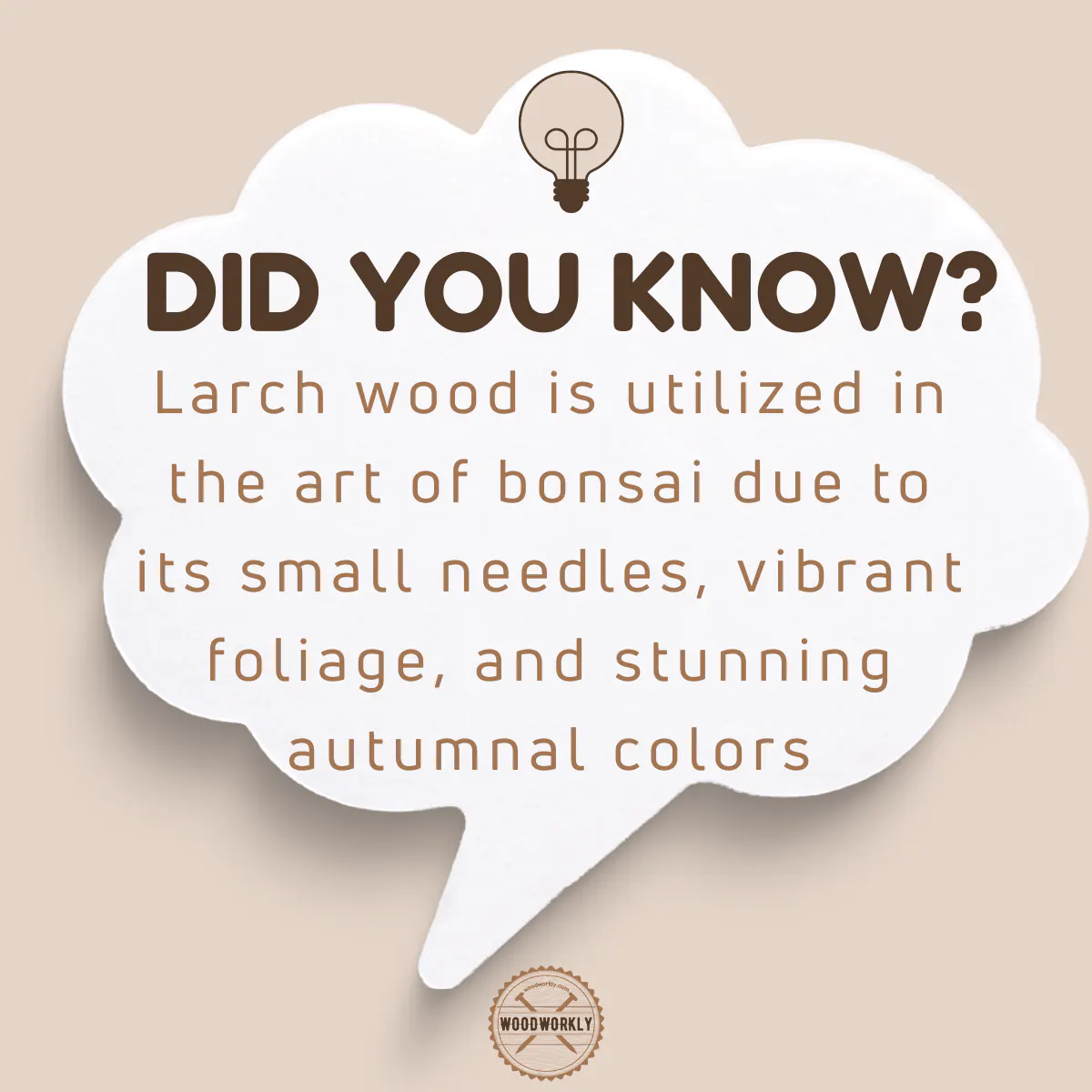
How Hard Is Larch?
Larch is considered one of the hardest softwoods among most of the softwoods that we’ve ever known.
Larch belongs to the softwood family but with exceptional qualities.
Larch is tougher, more durable, strong, and waterproof, and has excellent dimensional stability than most softwoods.
The hardness of larch wood is calculated by the Janka Hardness Test.
Janka hardness test is the standard method of testing the hardness of wood considering its wear and shear resistance.
If a particular wood has high shear and wear resistance, that means it has a high Janka hardness rating.
Larch wood has a Janka hardness rating of 830 lbf (3,690 N) which is significantly harder than most softwoods and some hardwoods as well.
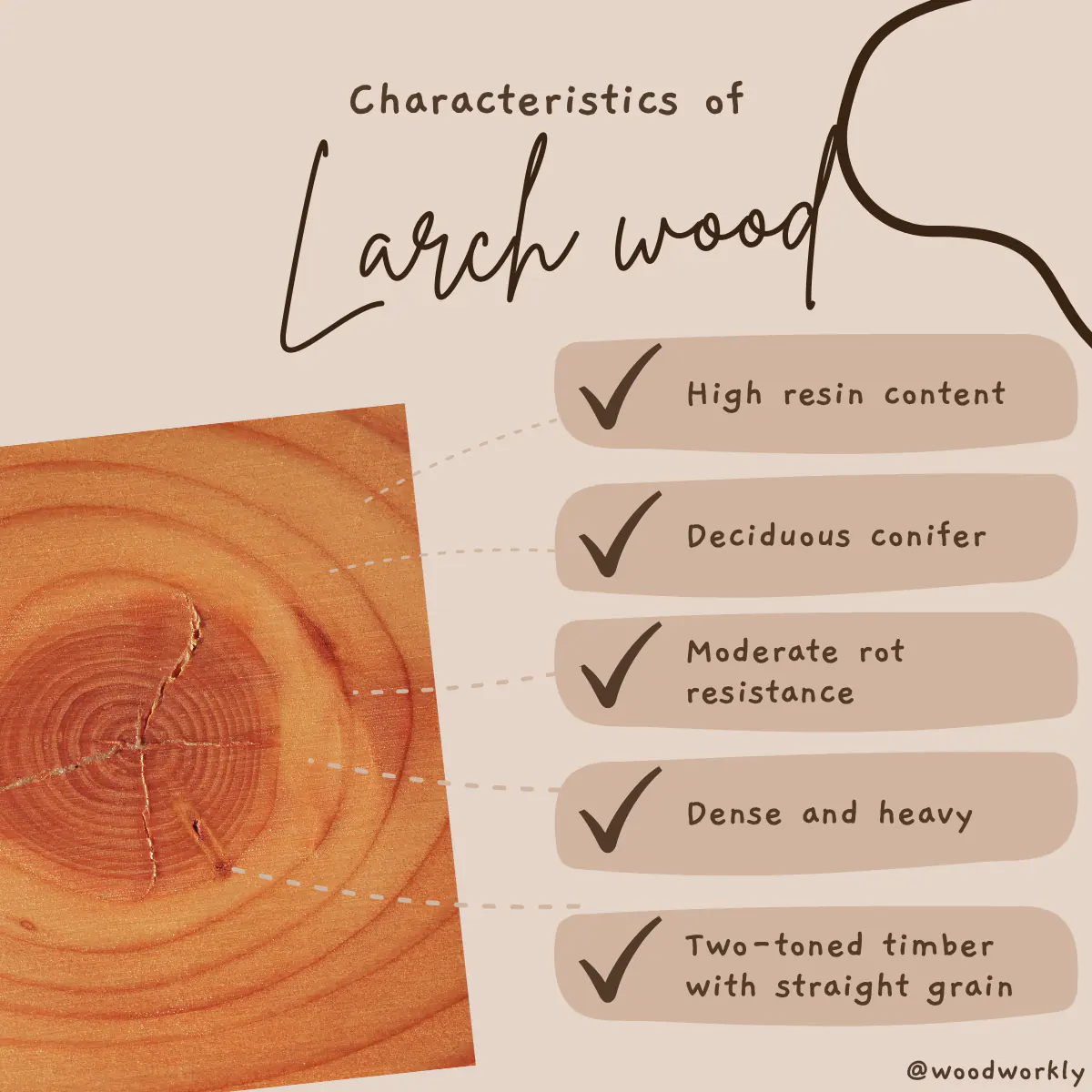
Larch comes from deciduous softwood trees with needles that lose leaves in autumn just like other softwoods. But it is heavier and tougher than other softwoods.
Larch wood has a uniform, straight grain with tough wood fibers and a fine texture. Resins and extractives of larch wood make it a more hard and durable material.
Usually, furniture made with larch has a service life of at least 15 years. That’s a good indicator of the durability and the high hardness of larch wood.
Well-maintained larch wood furniture lasts more than double 15 years. It is a hard softwood.
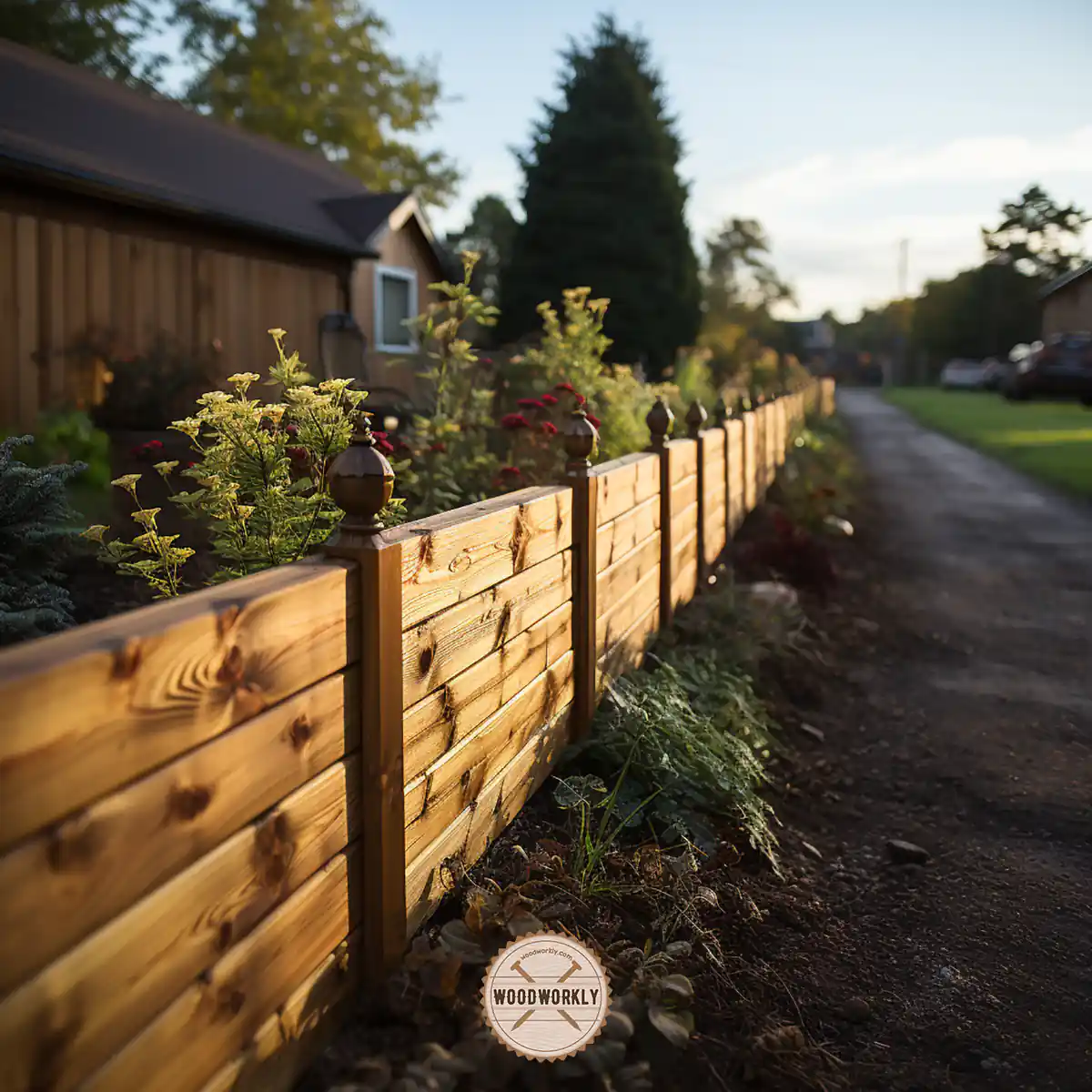
Hardness of Larch Compared to Other Woods
Larch wood is considered a quality softwood is a high Janka hardness rating of 830 lbf.
So, let’s have a look at the hardness of larch wood compared to other popular woods to get a better idea of how hard larch wood is.
| Wood Species | Hardness value |
| Brazilian Walnut | 3,684 lbf (16,390 N) |
| Red Mahogany, Turpentine | 2,697 lbf (12,000 N) |
| Brazilian Cherry, Jatoba | 2,350 lbf (10,500 N) |
| Golden Teak | 2,330 lbf (10,400 N) |
| Hickory, Pecan, Satinwood | 1,820 lbf (8,100 N) |
| Hard Maple, Sugar Maple | 1,450 lbf (6,400 N) |
| White Oak | 1,360 lbf (6,000 N) |
| Ash (White) | 1,320 lbf (5,900 N) |
| American Beech | 1,300 lbf (5,800 N) |
| Red Oak (Northern) | 1,290 lbf (5,700 N) |
| Yellow Birch / Baltic birch | 1,260 lbf (5,600 N) |
| Teak | 1,155 lbf (5,140 N) |
| Black Walnut, North American Walnut | 1,010 lbf (4,500 N) |
| Cherry | 995 lbf (4,430 N) |
| Black Cherry, Imbuia | 950 lbf (4,200 N) |
| Red Maple | 950 lbf (4,200 N) |
| Larch | 830 lbf (3,690 N) |
| Yellow Pine | 870 lbf (3,870 N) |
| Douglas Fir | 710 lbf (3,158 N) |
| Silver Maple | 700 lbf (3,100 N) |
| Hemlock | 540 lbf (2,402 N) |
| Black Spruce | 520 lbf (2,313 N) |
| Cypress | 510 lbf (2,269 N) |
| Redwood | 420 lbf (1,868 N) |
| Basswood | 410 lbf (1,823 N) |
| Engelmann Spruce | 390 lbf (1,735 N) |
| Sugar Pine | 380 lbf (1,690 N) |
| White Pine | 380 lbf (1,690 N) |
| Aspen | 350 lbf (1,557 N) |
| White Cedar | 320 lbf (1,423 N) |
As you can see even though larch wood is considered a softwood, it has a greater hardness value than most woods.
For example, Larch wood is harder than Pine, Cypress, Hemlock, Redwood, Aspen, and Spruce.
Because of being super hard and durable while being a softwood, larch wood is versatile wood in the woodworking world.
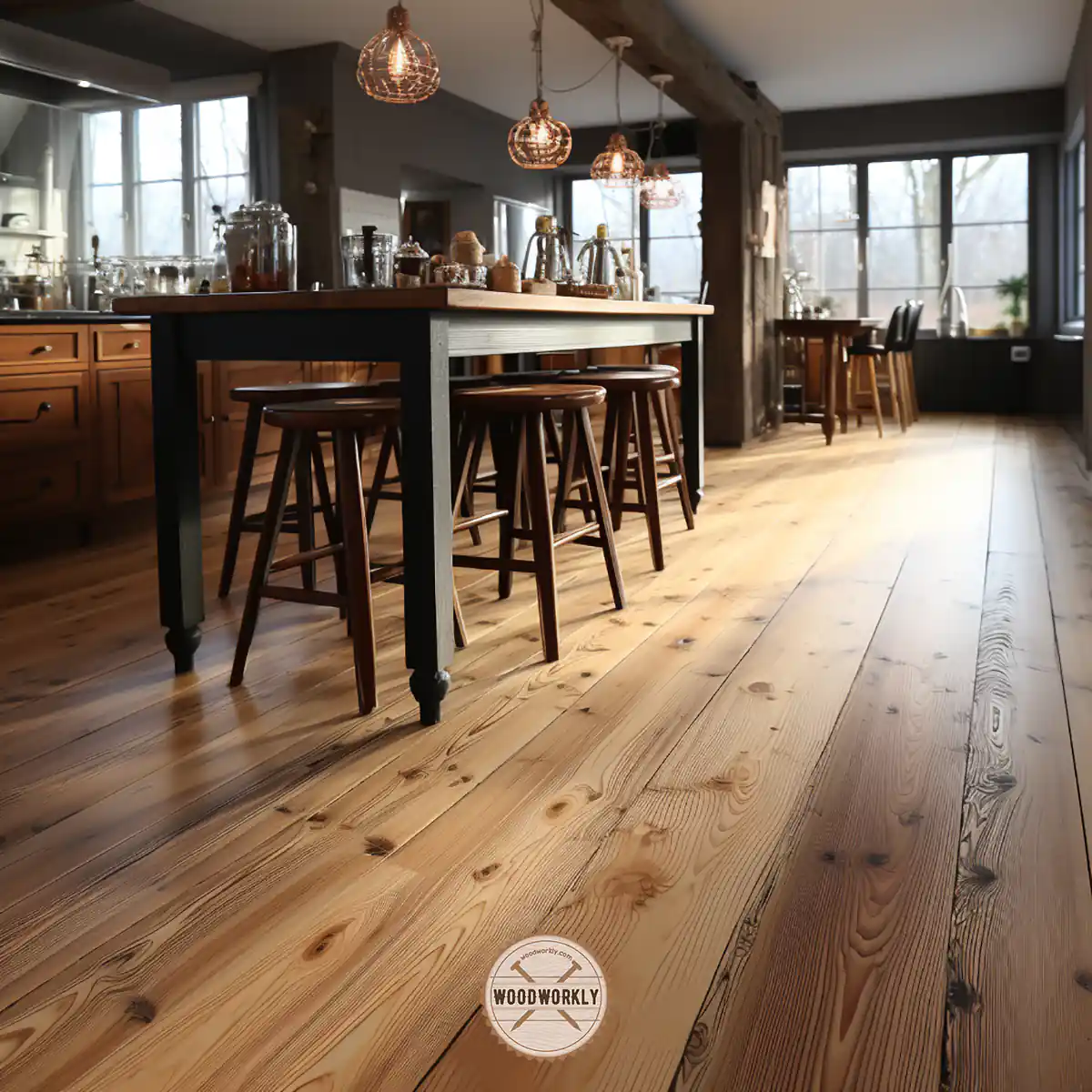
Let’s talk about the characteristic qualities of larch wood in terms of its hardness.
Larch Wood Characteristics
Larch wood heartwood has beautiful colors that range from yellow to reddish brown. It has even color with lots of character with growth rings.
Small knots add a unique natural look to your furniture.
Larch wood has a straight grain with an even texture. The tough fibers of larch wood make it strong, hard, tough, and more durable than other softwoods.
Even though larch wood cannot withstand extreme weather conditions, it has significantly high resistance against environmental elements such as moisture, temperature changes, and insect attacks.
Usually, softwoods can get easily damaged by insect attacks. But because of having natural insect-repellent ability with hardwood fibers, larch wood has good insect resistance.
On top of that larch wood is rot-resistant which makes it so special to other softwoods.
Most softwoods have no rot resistance, and you’ll have to use quality products like Flexseal to restore the wood.
But when it comes to larch wood, it has good decay resistance and hardwood features like rot resistance.
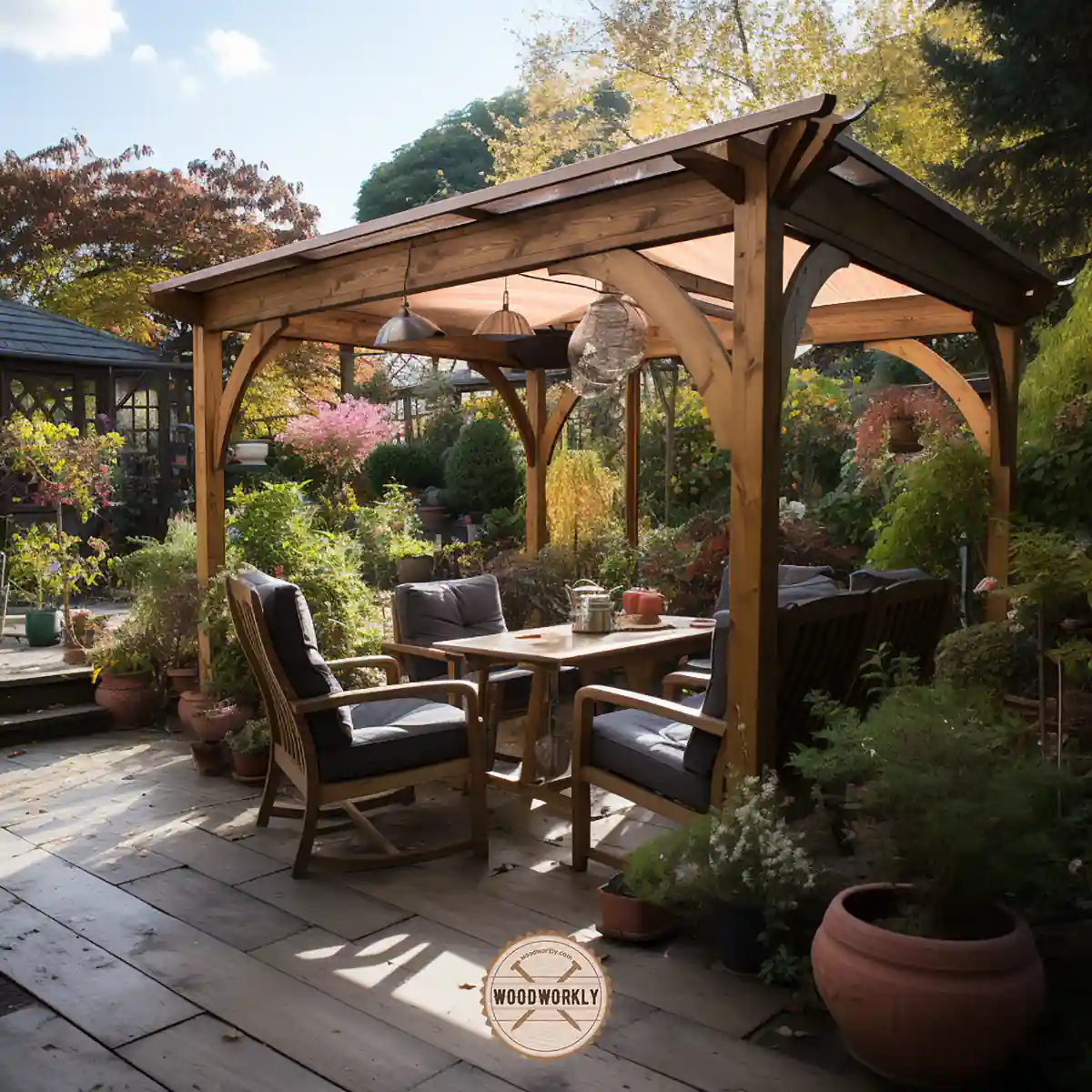
Since larch is a softwood, working with larch is easy.
Yes, it is not as easy as working with softer wood like Basswood, but with all other excellent woodworking qualities, having good workability is a plus point for larch.
Therefore cutting, drilling and screwing are easy to do with larch wood. Wood is not prone to chips since it has good toughness and hardness.
Since Larch is a a softwood with greater hardness and stability, it is great for wood carving projects.
Gluing and finishing are also easy with larch wood. It is one of the most underrated wood types on the planet.
Here’re some most significant qualities of Larch wood,
- Softwood
- High durability
- High hardness
- Tough wood fibers
- Rot-resistant
- Decay resistant
- Cannot withstand extreme weather
- Insect resistant
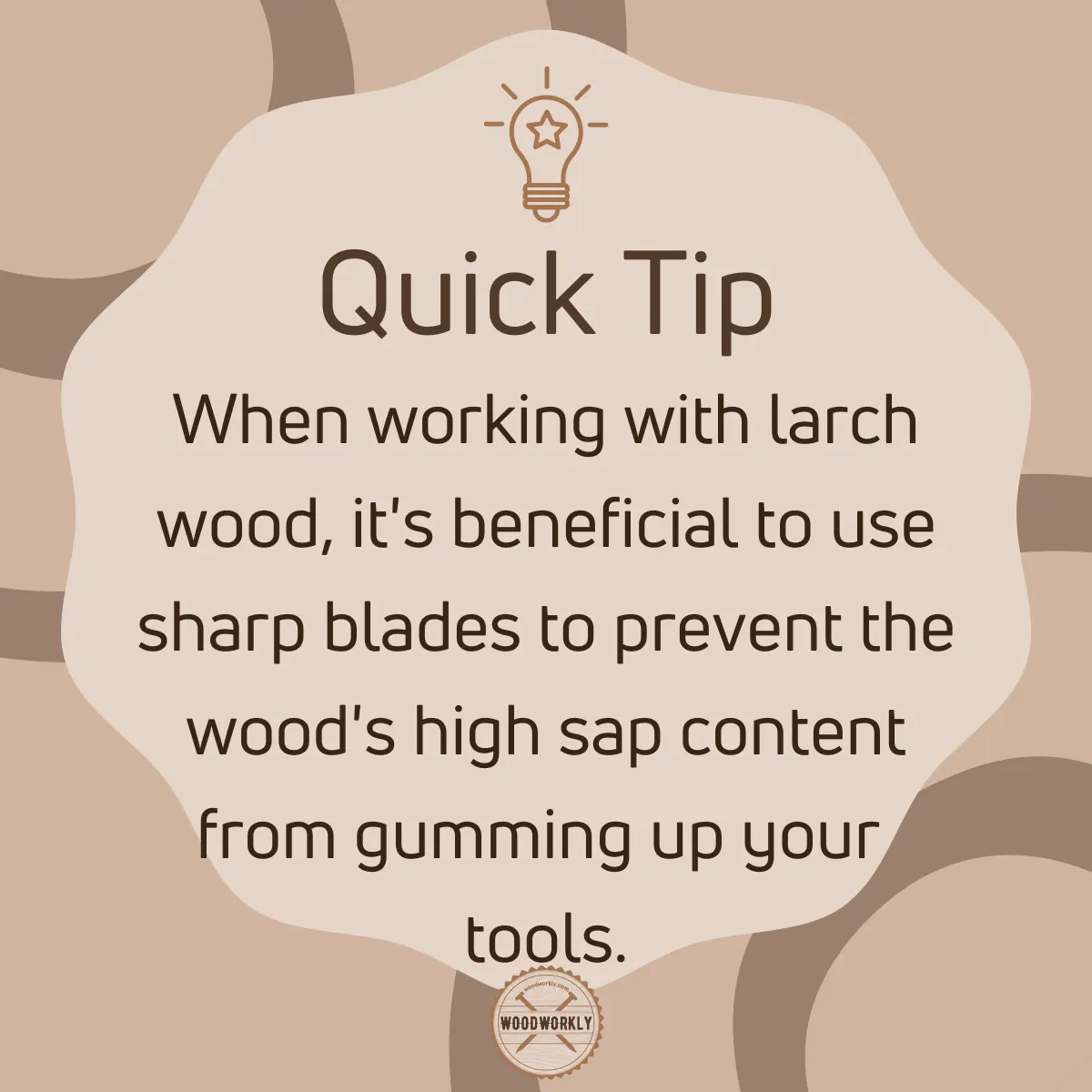
Properties of Larch Wood
Here are the main characteristic features of Larch wood,
| Color | Reddish Brown |
| Density | 0.5 kg/m3 |
| Hardness | 830 lbf |
| Wood Type | Softwood |
| Applications | Fencing, Flooring, Furniture making |
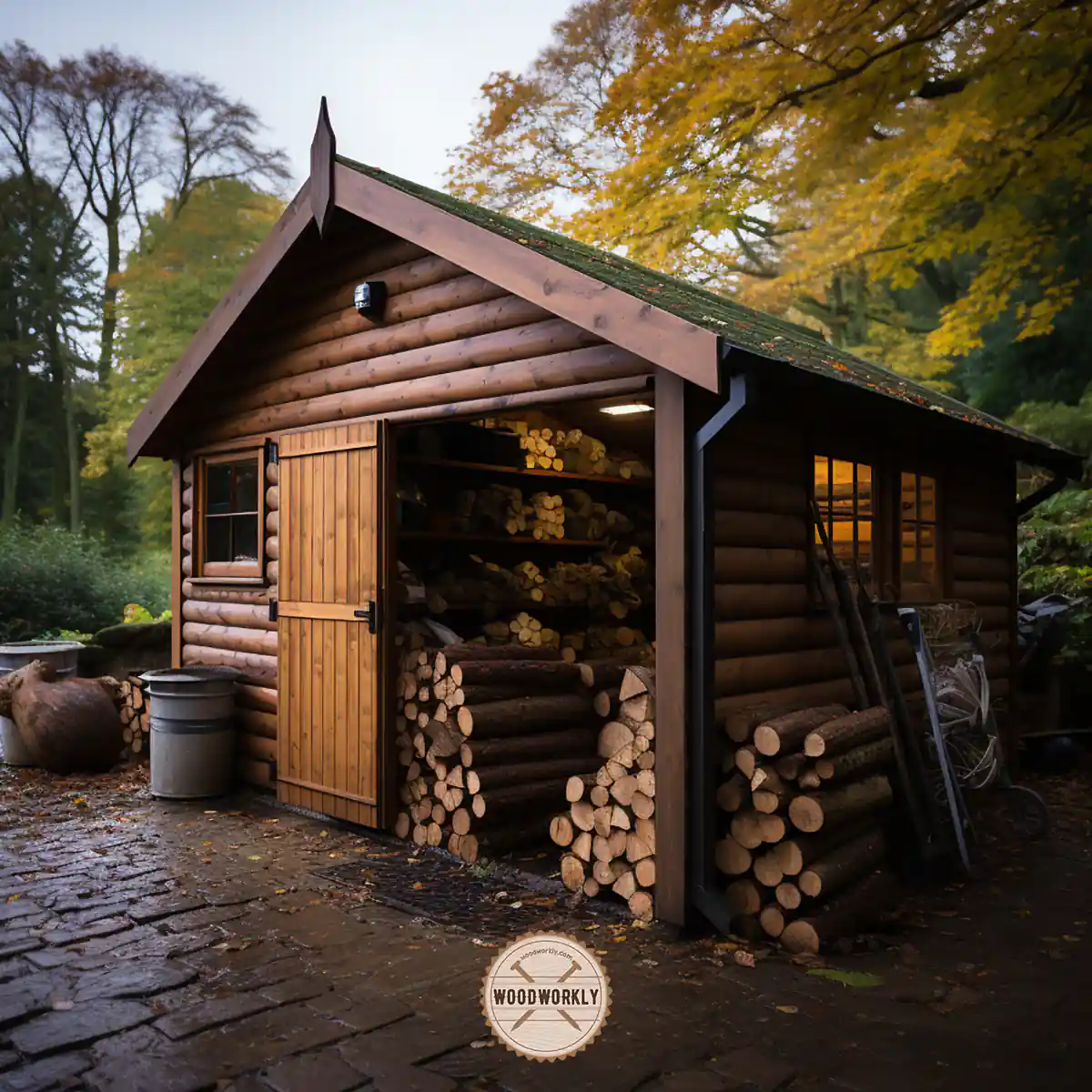
So, let’s have a look at the disadvantages and disadvantages of larch softwood.
Pros And Cons of Larch
| Pros | Cons |
| Beautiful appearance | Distinct odor |
| Insect resistant | Expensive |
| High durability | High resin content |
| Rot-resistant | Less availability |
| Decay resistant | Poor weather resistance |
| High workability | Need regular maintenance |
| Stronger than softwoods | |
| High dimensional stability |
As you can see, larch wood has excellent woodworking qualities because of its great hardness compared to other softwoods.
Most of the disadvantages of larch wood can be easily fixed with proper finishing and with good maintenance.
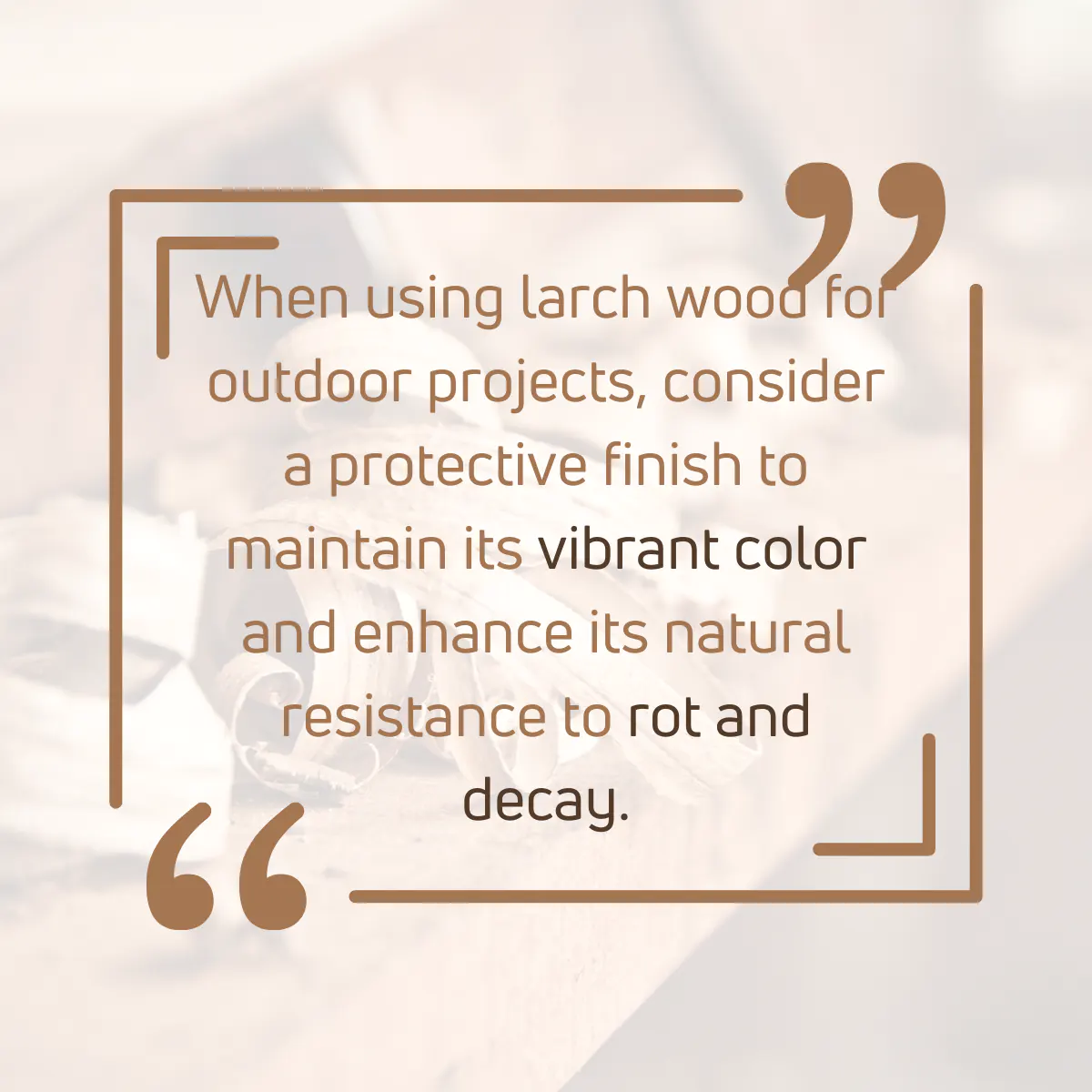
Let’s have a look at the popular applications of larch wood as a softwood.
What Is Larch Used For?
Larch wood is commonly used for,
- Furniture making
- Fencing
- Flooring applications
- Sheds
- Homes
- Paneling
- Wood carving projects
- Boat constructions
- Veneer
- Particleboards
- Bathroom Shelves
- Gazebos making
Larch wood is a multi-purpose softwood with lots of qualities that are applicable to various applications.
You only need to apply quality finisher like Tung oil or Danish oil on larch wood to keep it for more than 15 years or longer with no issues.
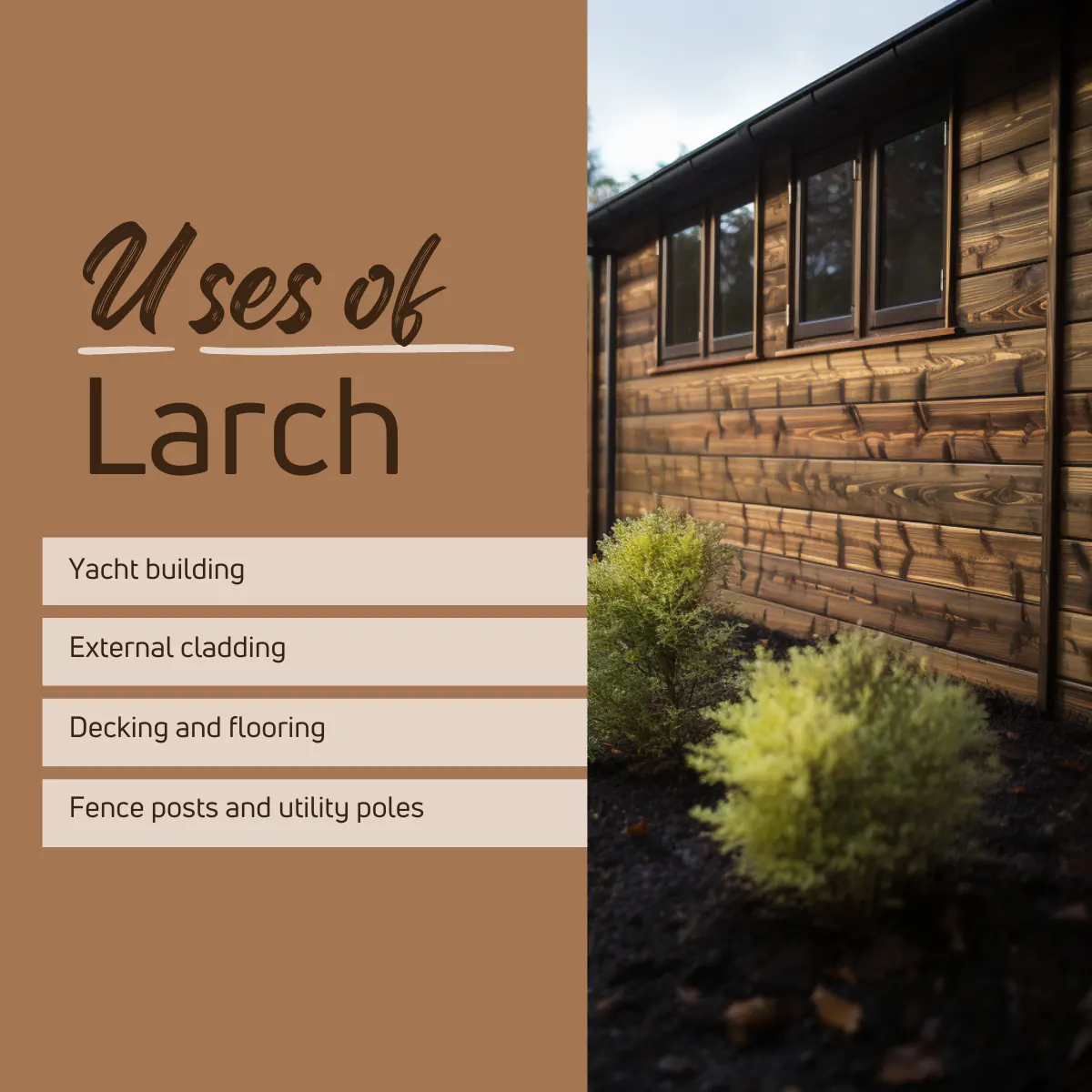
Let’s see how strong larch wood is as a hard softwood.
How Strong Is Larch Wood?
Larch wood is stronger than most softwood with similar properties since larch wood has high hardness, toughness, and durability.
Larch wood is stronger than some popular softwoods like Pine, Redwood, Spruce, and Cedar.
Larch wood has tough and strong fibers with exceptional dimensional strength. This makes larch wood furniture and woodwork steady for so long.
The compressive strength and bending strength of larch wood are as follows,
- The compressive strength of Larch is 8,120 psi parallel to the grain
- The bending strength of larch is 4,600 psi
As you can see it has great values in strength. Because of having good flexural strength larch wood can easily soften with steam bending.
Because of being so strong apart from being a softwood, larch wood can be used to make any woodworking project without worrying about its strength and durability.
You can make wood carvings and decorative items in a long run since larch is equipped with super rare qualities like being a softwood with great strength.
Even though larch wood is strong compared to other softwoods, it is not strong as luxurious hardwoods like Mahogany, Ash, and Hickory.
Therefore, larch wood is not the best wood to use as a construction material.
But it can use to make boat constructions because of being a highly workable wood with waterproofing abilities.
Overall, larch wood is one of the few softwoods that can use for both indoor and outdoor woodworking projects with no issues because of its excellent hardness and strength.
That’s it, folks! Hope you have found the detailed answer to the hot question, is larch a hardwood?
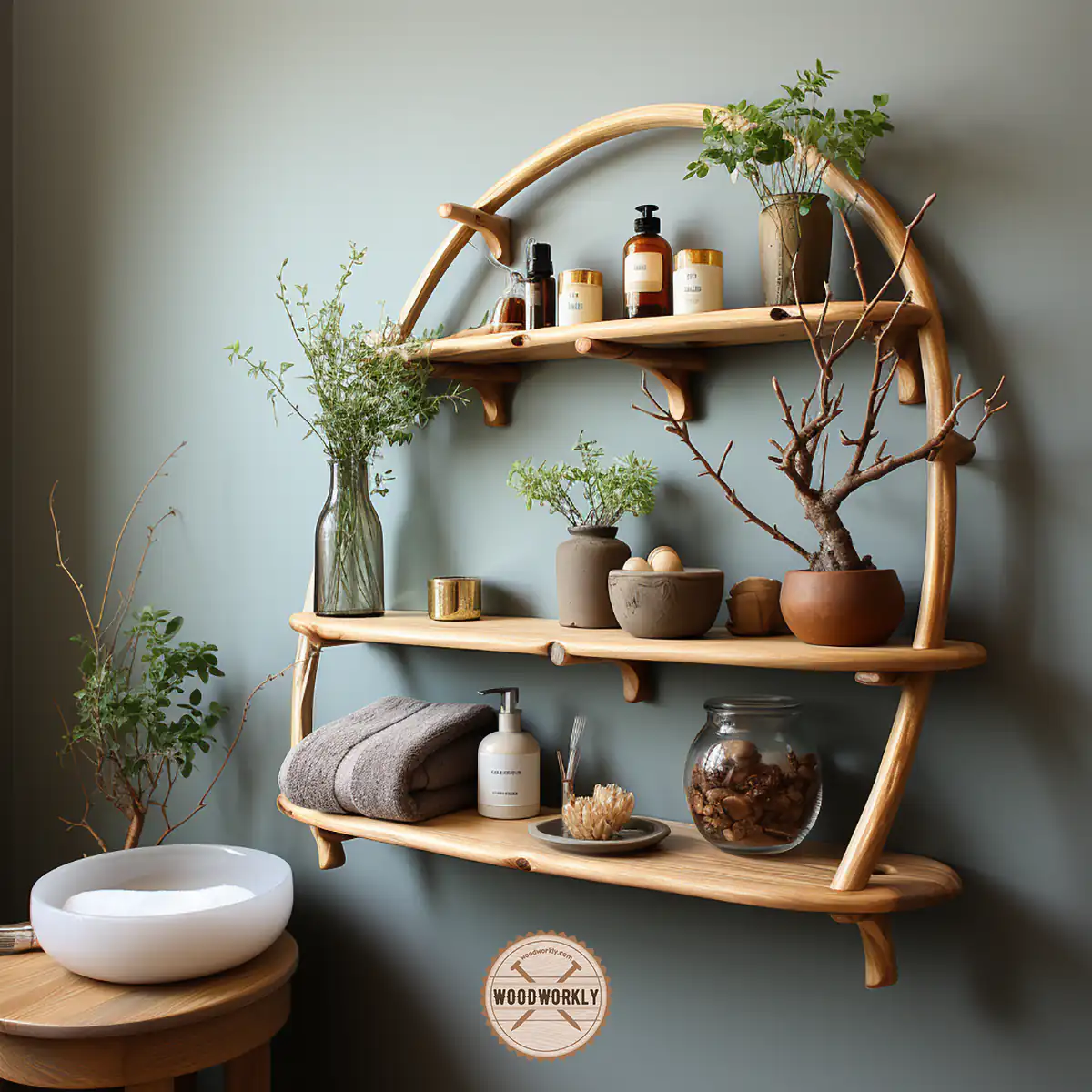
Is Larch Hard To Split?
Larch is easy to split since it is a softwood. Therefore, larch is a great wood for firewood.
After splitting larch wood, you can let it for drying and use it to burn. Larch wood won’t crack when drying due to its excellent strength and durability.
Is Larch Harder Than Birch?
Birch is significantly harder than larch since birch is a hardwood and larch is a softwood.
Birch is stronger, tougher, and more durable than larch.
Therefore, you can easily replace larch wood with Birch since it has great construction qualities than larch with excellent resistance to environmental elements such as moisture.
According to the Janka hardness ratings, the hardness of Larch and Birch is as follows,
| Wood Type | Hardness |
| Larch | 830 lbf |
| Birch | 1,260 lbf |
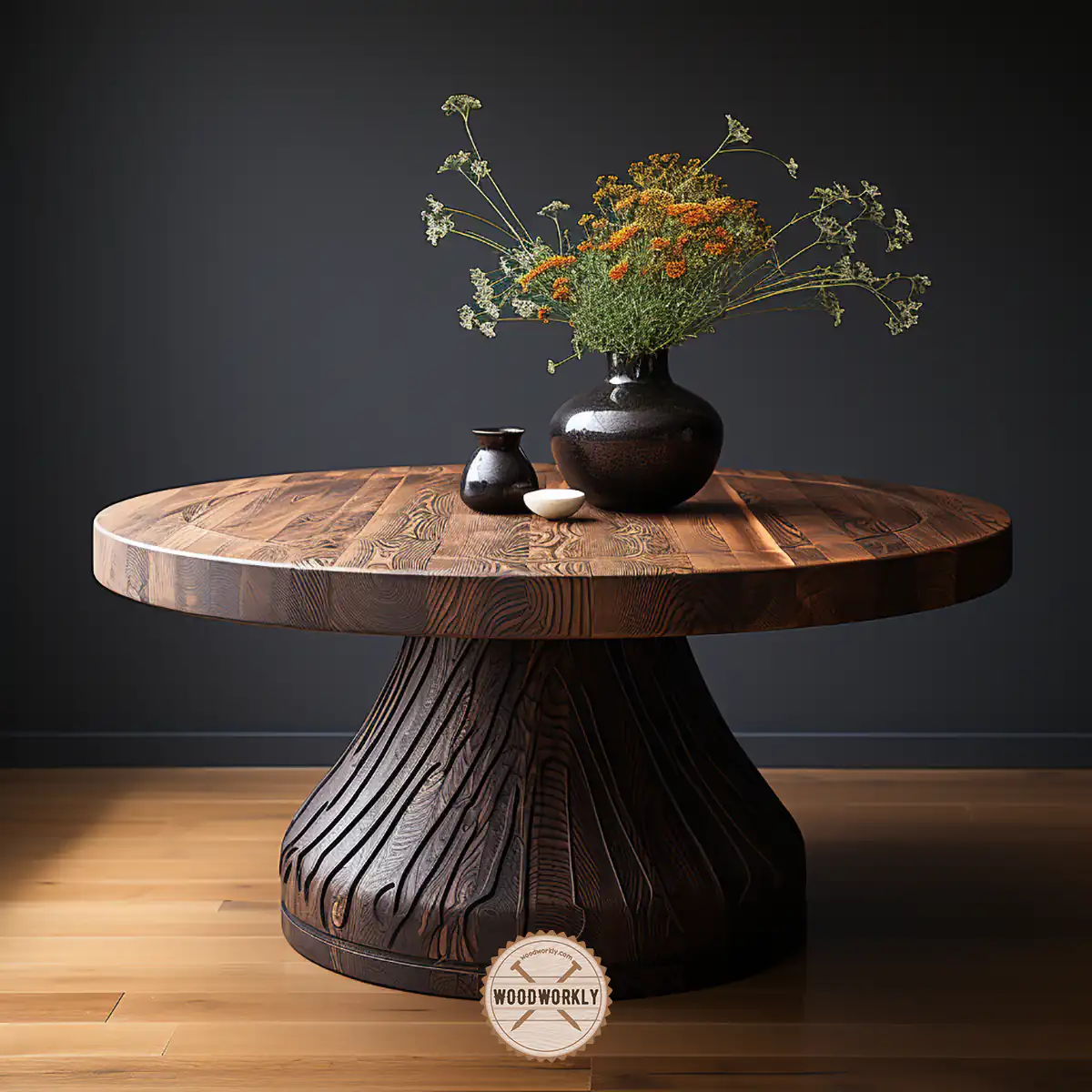
Is Larch Harder Than Maple?
Maple is harder than larch since maple is a hardwood and larch is a softwood. both hard maple and soft maple are stronger, harder, and more durable than larch.
According to the Janka hardness ratings, the hardness of Larch and Maple is as follows,
| Wood Type | Hardness |
| Larch | 830 lbf |
| Hard Maple | 1,450 lbf |
| Soft Maple | 950 lbf |
So, let’s answer some frequently asked questions.
FAQs
What are the distinguishing features of Larch wood?
Larch wood is known for its two-toned timber, featuring nearly white sapwood and a heartwood that varies from golden brown to reddish-brown, providing both visual appeal and functionality in various projects.
Can Larch wood be used for construction?
Yes, Larch wood is favored in construction due to its high density, toughness, and weatherproofing properties, making it an excellent material for external cladding projects and yacht building.
Does Larch wood have any unique sensory characteristics?
Absolutely, Larch wood exudes a distinct resinous odor when worked upon, and its texture is often described as having a greasy or oily feel, providing a unique experience for craftsmen.
Is Larch wood sustainable?
Yes, Larch wood is considered sustainable as it is not listed on the CITES Appendices and is recognized as a species of least concern according to the IUCN.
How does Larch wood respond to different woodwork processes?
While Larch wood can be worked upon with both hand and machine tools successfully, craftsmen should be prepared for the wood’s high sap content which has a tendency to gum up blades.
What is the typical use of Larch wood in landscaping and gardening?
Larch wood is prized in bonsai culture due to its small needles, lively foliage, and vibrant autumnal colors, adding a touch of natural artistry to gardens and indoor spaces.
What makes Larch wood a popular choice for external and internal cladding?
Larch wood is popular for cladding owing to its water-resistant heartwood and visually pleasing golden-red hues, offering a combination of durability and aesthetic appeal.
Is there a method to preserve the original color of Larch wood?
Yes, to maintain the vibrant original color of Larch wood, specific treatments are available that prevent rot and fungi, allowing for controlled and limited degradation over time.
Did I cover all you wanted to know about: Is Larch A Hardwood
In this article, we have deeply discussed, whether is larch a hardwood, and how hard larch wood is by considering its characteristic qualities with pros and cons.
Larch is not a hardwood; it is technically classified as a softwood. Despite its tough and dense characteristics, which are similar to hardwoods, larch is a coniferous tree that bears cones and has needle-like leaves that shed in the autumn, categorizing it as a softwood.
Furthermore, I’ve answered some frequently asked questions as well.
Hope you have gained good knowledge about is larch a hardwood and how soft larch wood is.
Use larch wood for your next woodworking projects and see how its hardness is important when making woodwork with high durability. Happy woodworking with larch wood!
Would you recommend larch for garden gates that will be painted white?